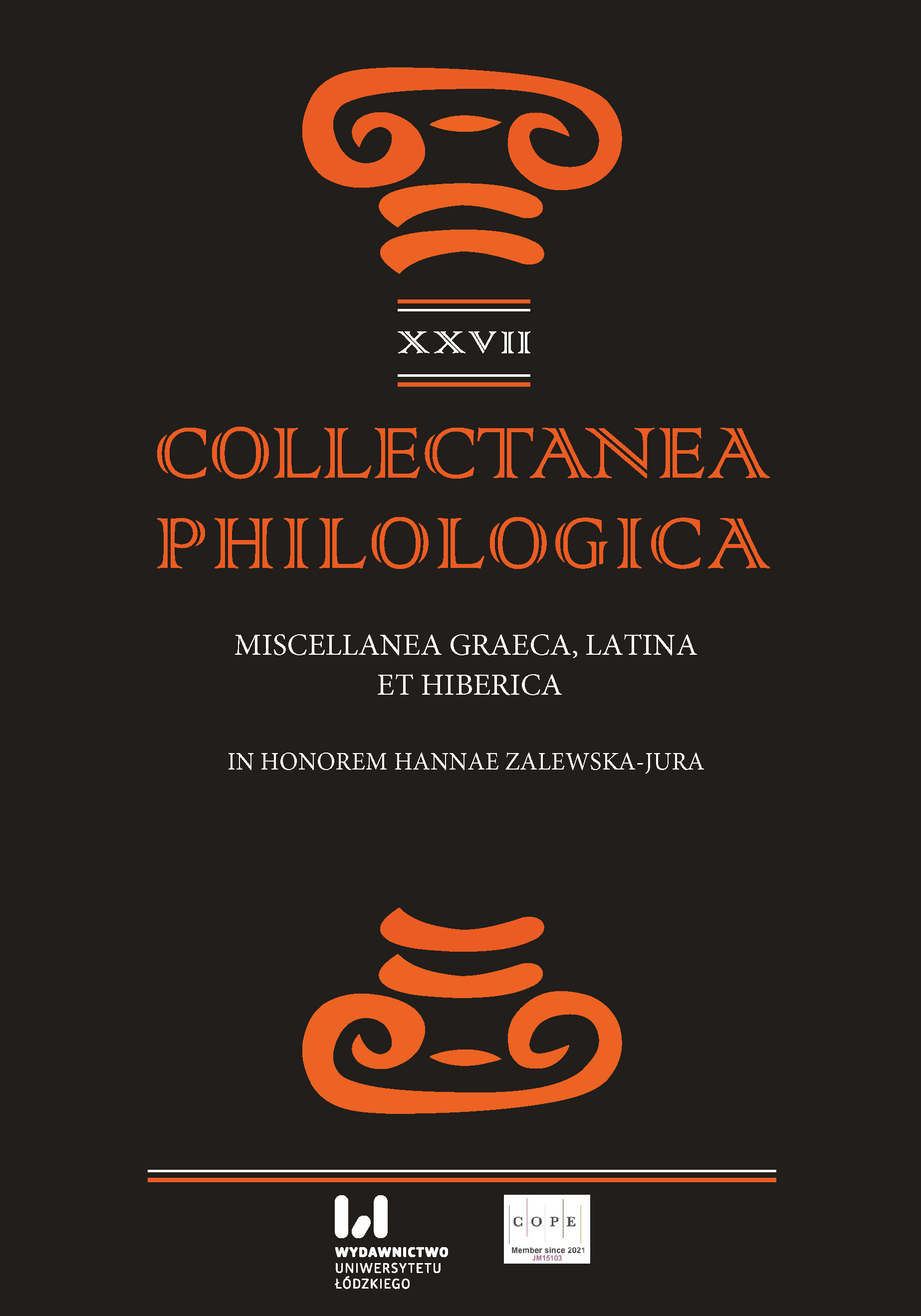Homeric Traces in a "True Story" of Lucian of Samosata
DOI:
https://doi.org/10.18778/1733-0319.27.04Keywords:
Homer, the Homeric question, reception, Lucian, A True StoryAbstract
Lucian of Samosata was one of the representatives of the Second Sophistic who referred to Homer’s poems in his work. There are many opinions in the literature that Lucian mocked Homer in order to belittle his authority. Lucian’s work A True Story does not shy away from references to Greece’s first poet, including in the context of humour and parody. The aim of this article is to show how Lucian uses Homer’s epics in A True Story – can we say that the reception Lucian makes in his satire only shows that the Greek poet was fodder for mockery, or can we also see there some signs of respect for Homer.
References
Homer. (1924, 1925). Iliad. A.T. Murray, W.F. Wyatt (eds.). Vol. I–II. Cambridge (Massachusetts): Harvard University Press.
Google Scholar
DOI: https://doi.org/10.4159/DLCL.homer-iliad.1924
Homer. (1995). Odyssey. G.E. Dimock, A.T. Murray (eds.). Vol. I–II. Cambridge (Massachusetts): Harvard University Press.
Google Scholar
Lucianus. (1972). Opera. Recognovit brevique adnotatione critica instruxit M.D. Macleod. T. I. Libelli 1–25. Oxonii: Oxford University Press.
Google Scholar
Homer. (2020). Odyseja. Przeł. R.R. Chodkowski. Lublin: Towarzystwo Naukowe KUL.
Google Scholar
Homer. (2022). Iliada. Przeł. R.R. Chodkowski. Lublin: Towarzystwo Naukowe KUL.
Google Scholar
Lukian. (2006). Dialogi. Tom I. Przeł. M.K. Bogucki. Wrocław: Ossolineum.
Google Scholar
Brillet-Dubois, P. (2006). L’art. Formulaire d’Homère dans les Histoires Vraies de Lucien. Gaia 10. 219–234. https://doi.org/10.3406/gaia.2006.1500
Google Scholar
DOI: https://doi.org/10.3406/gaia.2006.1500
Butler, S. (1897). The Authoress of the Odyssey: Who and What She Was, When and Where She Wrote. https://www.gutenberg.org/cache/epub/49324/pg49324-images.html (01.06.2024).
Google Scholar
Foley, J.M. (2007). “Reading” Homer through Oral Tradition. College Literature 34(2). 1–28.
Google Scholar
DOI: https://doi.org/10.1353/lit.2007.0015
Fowler, R. (2006). The Homeric Question. In: R. Fowler (ed.). The Cambridge Companion to Homer. Cambridge: Cambridge University Press. 220–232.
Google Scholar
DOI: https://doi.org/10.1017/CCOL0521813026.014
Fredericks, S.C. (1976). Lucian’s True Story as SF. Science Fictions Studies 3(1). 49–60.
Google Scholar
Gassino, I. (2010). Par-delà toutes les frontières: le pseudos dans les Histoires vraies de Lucien. In. F. Mestre, P. Gómez (eds.). Lucian of Samosata, Greek Writer and Roman Citizen. Barcelona: Universitat de Barcelona. 88–98.
Google Scholar
Georgiadou, A., Larmour, D.H.J. (1998). Lucian’s Science Fiction Novel. True Histories. Leiden–Boston–Köln: Brill.
Google Scholar
Gunn, J. (1985). Droga do science fiction. Od Gilgamesza do Wellsa. Warszawa: Wydawnictwo „ALFA”.
Google Scholar
Hezser, C. (2013). Ancient „Science Fiction”: Journeys into Space and Visions of the World in Jewish, Christian, and Greco-Roman Literature of Antiquity. In: S.E. Porter, A.W. Pitts (eds.). Christian Origins and Hellenistic Judaism. Leiden–Boston: Brill. 397–438.
Google Scholar
DOI: https://doi.org/10.1163/9789004236394_016
Holzman, K. (1984). Z rozważań nad strukturą dialogu: elementy dialogowe w tekstach ciągłych Lukiana. Pamiętnik Literacki: czasopismo kwartalne poświęcone historii i krytyce literatury polskiej 75/3. 163–175.
Google Scholar
Kim, L. (2010). Homer between History and Fiction in Imperial Greek Literature. New York: Cambridge University Press.
Google Scholar
DOI: https://doi.org/10.1017/CBO9780511761744
Kim, L. (2022). Homer in the Second Sophistic. In: C.-P. Manolea (ed.). Brill’s Companion to the Reception of Homer from the Hellenistic Age to the Late Antiquity. Leiden–Boston: Brill. 164–188.
Google Scholar
DOI: https://doi.org/10.1163/9789004472686_009
Korus, K. (1988). Od retoryki do satyry greckiej. Lukian z Samosat. Wrocław–Warszawa–Kraków: Ossolineum.
Google Scholar
Maciver, C.A. (2016). Truth, Narration, and Interpretation in Lucian’s “Verae Historiae”. The American Journal of Philology 137(2). 219–250.
Google Scholar
DOI: https://doi.org/10.1353/ajp.2016.0010
Manguel, A. (2010). Homer. Iliada i Odyseja. Biografia. Przeł. H. Jankowska. Warszawa: Warszawskie Wydawnictwo Literackie MUZA SA.
Google Scholar
Matteuzzi, M. (2003). A proposito di Omero “Babilonese” (Lucian. V.H. II 20). Sandalion. Vol. 23–25. 49–51.
Google Scholar
Mheallaigh, K. ní. (2014). Reading Fiction with Lucian. Fakes, Freaks and Hyperreality. Cambridge: Cambridge University Press.
Google Scholar
DOI: https://doi.org/10.1017/CBO9781139941594
Nagy, G. (2002). Homeric Questions. Austin: University of Texas Press.
Google Scholar
O Homerze i Hezjodzie, o ich pochodzeniu i współzawodnictwie. (2007). W: Homeriká czyli żywoty Homera i poematy przypisywane poecie. Przeł. W. Appel. Warszawa: Prószyński i S-ka. 43–61.
Google Scholar
Podbielski, H. (2005). Homer. W: Literatura Grecji starożytnej. Tom I. H. Podbielski (red.). Lublin: Towarzystwo Naukowe KUL. 67–149.
Google Scholar
Porter, J.I. (2018). Homer in the Gutter: From Samuel Butler to the Second Sophistic and Back Again. In: M. Formisano, Ch., Shuttleworth Kraus (eds.). Marginality, Canonicity, Passion. Oxford: Oxford University Press. 231–261.
Google Scholar
DOI: https://doi.org/10.1093/oso/9780198818489.003.0009
Russell-Schlesinger, Ch.H. (2013). The Vera Historia behind Lucian’s Relationship with Homer: Homeric Intertext in Lucian’s Science Fiction Novel. Athens, Georgia. https://getd.libs.uga.edu/pdfs/russell-schlesinger_charles_h_201305_ma.pdf (15.05.2024).
Google Scholar
Tianran, L. (2018). Reviving and Revising the Classical Past: Studies in the Intertextuality of Lucian’s True Histories. (Master of Arts in Classics). Tufts University.
Google Scholar
Trzcionkowski, L. (2005). Historyczne aspekty eposu homeryckiego. W: Literatura Grecji starożytnej. Tom I. H. Podbielski (red.). Lublin: Towarzystwo Naukowe KUL. 41–66.
Google Scholar
Zeitlin F.I. (2001). Visions and Revisions of Homer. In: S. Goldhill (ed.). Greek under Rome. Cultural Identity, the Second Sophistic and the Development of Empire. Cambridge: Cambridge Univeristy Press. 195–266.
Google Scholar
DOI: https://doi.org/10.1017/CBO9780511627323.007
Downloads
Published
Versions
- 2024-10-30 (2)
- 2024-10-30 (1)
How to Cite
Issue
Section
License

This work is licensed under a Creative Commons Attribution-NonCommercial-NoDerivatives 4.0 International License.












